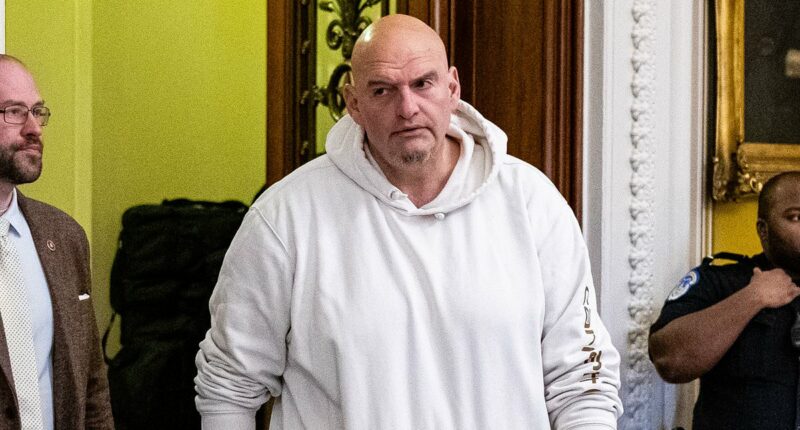Share this @internewscast.com
In a candid and comprehensive interview, Democratic Senator John Fetterman criticized his party for withholding funds and causing a shutdown of the Department of Homeland Security (DHS).
The Pennsylvania senator expressed that the Democratic Party’s biggest challenge in the upcoming midterm elections is its tendency to make condescending remarks towards voters.
“I don’t treat voters like children,” Fetterman shared during an interview with Politico’s White House Bureau Chief Dasha Burns on The Conversation podcast, when discussing the approaching elections.
He pointed out that Democrats often patronize voters, especially when explaining why shutting down the government is problematic.
Fetterman also addressed why he broke ranks with his party, being the only Democrat to support DHS funding. However, he still holds the view that Secretary Kristi Noem should be removed from her role in leading the department responsible for immigration enforcement.
“I strive to be reasonable and serve as the voice of reason during increasingly unreasonable times,” he remarked. His comments came shortly after the Senate voted on whether to continue funding the DHS.
The Pennsylvania Democrat was the only one senator in his party to vote to advance a full-year funding package for DHS. This lined up with his long-held position against any government shutdowns.
But the rest of his colleagues in the upper chamber forced withholding of that funding.

Senator John Fetterman said Democrats need to stop treating voters ‘like children’ if they want to win the 2026 midterms and slammed his party for voting to shut down DHS

Even though Fetterman agrees with needing ICE reform, he believes voting against DHS funding is only hurting other agency’s at the Department like FEMA, the Coast Guard and CISA
He argued in a post to X after the vote that voting against the bill would do nothing to stop Immigration and Customs Enforcement from continuing their operations.
‘Shutting DHS down has zero impact and zero changes for ICE,’ he wrote on X. ‘ICE has $75B in funding from Trump BBB that I did not vote for. But it will hit FEMA, Coast Guard, TSA and our Cybersecurity Agency.’
‘As a Democrat, I can’t vote to shut down critical parts of our government,’ the senator added.
Fetterman maintains there should be ICE reforms, but he thinks shutting down DHS is more a virtual signal from his colleagues without any real movement words achieving that goal.
He articulated that in the sit-down on Politico’s podcast.
‘It’s almost becoming some kind of a perverse kinds of entertainment,’ he said of Democrats flip-flopping on shutdowns and the filibuster, in particular.
‘It’s like the ‘Real Housewives of Washington, DC’ where we’re fighting about this stuff… and suddenly it’s moved onto something else, or a dumb tweet,’ he went on.
‘The important things aren’t really getting addressed.’
He told Burns when discussing the upcoming midterms that polling doesn’t look good for Democrats as the party attempts to take back control in Congress to stymie President Donald Trump’s agenda.
‘I mean, have you seen the last polling? You know, our brand continues to drop,’ he pointed out.
‘I just want to be… a Democrat that it’s like ‘hey, I have these values and … and that’s why I vote this way.’
One way that Fetterman does stick with his party, however, is in calling for Noem to no longer head DHS.

Fetterman agrees that DHS Secretary Kristi Noem should be ousted after the failure in Minnesota last month that led to the deaths of two Americans protesting ICE operations
Fetterman, in a wandering statement that wasn’t entirely clear, appeared to tell Burns that he called Trump to tell him that Noem needed to be booted.
‘You have a Mayorkas on your administration, President Trump. Mayorkas is not illegal, but he’s, you know, incompetent and not doing his job,’ Fetterman recounted.
‘You said that to Trump about DHS Secretary Noem?’ Burns prompted for clarity.
He replied: ‘Yeah, well, that’s why I said that because I say less hoping – and it seems to like, it might matter more.’
‘And after what happened in Minneapolis it’s entirely appropriate,’ he continued. ‘It’s like, I don’t know why you want to hang on to this.’
Two Americans were killed last month by DHS agents with ICE and CBP in two different incidents where they were protesting immigration enforcement operations in Minnesota. This has led to widespread and bipartisan calls for reforms within the Department.











